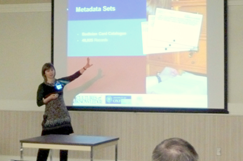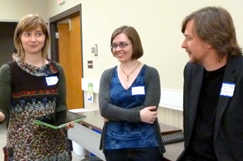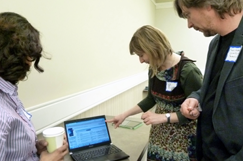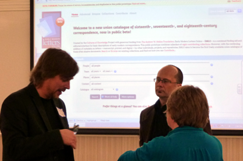Gender and the Digital Silo: CofK at Situating Early Modern Science Networks Workshop
Tags: Databases, Gender, Hans Sloane, History of Science, Networks, Union Catalogue, Union Catalogue News, Women
I’ve recently returned from the Situating Early Modern Science Networks workshop at the University of Saskatchewan in a chilly but sunny Saskatoon. Hosted by Dr Lisa Smith (who we met when she gave an excellent paper on Hans Sloane’s correspondence in our 2011 seminar series), the two-day event (12-13 April) saw scholars from the UK, Canada and the US – generously funded by the conference – speak about early modern networks from a wide range of disciplinary perspectives, including English, History, and the History of Science.

Introducing the catalogue.

Post-presentation discussion.
My paper ‘Digitizing Gender: Women’s Correspondence and Knowledge Networks in the Early Modern Era’ focused on the ideological and technical challenges of digitizing gender, including the so-called ‘digital gender ghetto’ wherein data on early modern women is only collected and made accessible within gender-specific online silos. Such resources, while valuable, raise methodological and conceptual difficulties; not only does the information they contain often get bypassed by large portions of the scholarly community, but the long-standing trope that early modern women occupied a hermetically sealed separate sphere is implicitly reinforced, sustaining unhelpful assumptions that they were not fully engaged in intellectual or public life. To overcome this predicament, I suggested that we need to develop digital systems which can link or speak to each other so that data on men and women can be interrogated simultaneously. By doing this, the role played in early modern knowledge communities by individuals such as Katherine Jones, Lady Ranelagh, or Dorothy Moore Dury, for example, can be properly assessed and appreciated within a wider network of both male and female individuals and correspondents.

The ‘Digital Coffee House’.

EMLO on the big screen.
The potential for online resources to facilitate and manifest these kinds of connections became clear during the hands-on ‘Digital Coffeehouse’ portion of the workshop, during which participants were introduced to the following array of early modern digital resources: The Digital Ark, The Newton Project, The Sloane Printed Books Project, The Grub Street Project, The Textual Communities Project, Digital MappaeMundi, and our own Early Modern Letters Online. Future digital collaborations may well result! The conference was rounded out with a thought-provoking talk by Professor Robert Iliffe on the implications for scholarly work arising from the increasing digitization of the academic infrastructure. His presentation sparked a lively debate during the roundtable discussion on the future of online scholarship which covered how the UK’s REF (Research Excellence Framework) assessments handle digital humanities outputs; the ownership of digital materials; concerns about scholars losing old skills and values in favour of new ones; and a consideration of the perils and benefits of crowdsourcing.


 Join
Join 